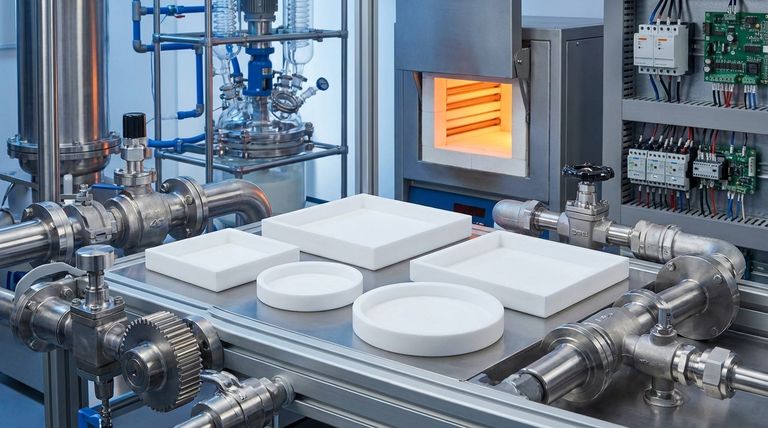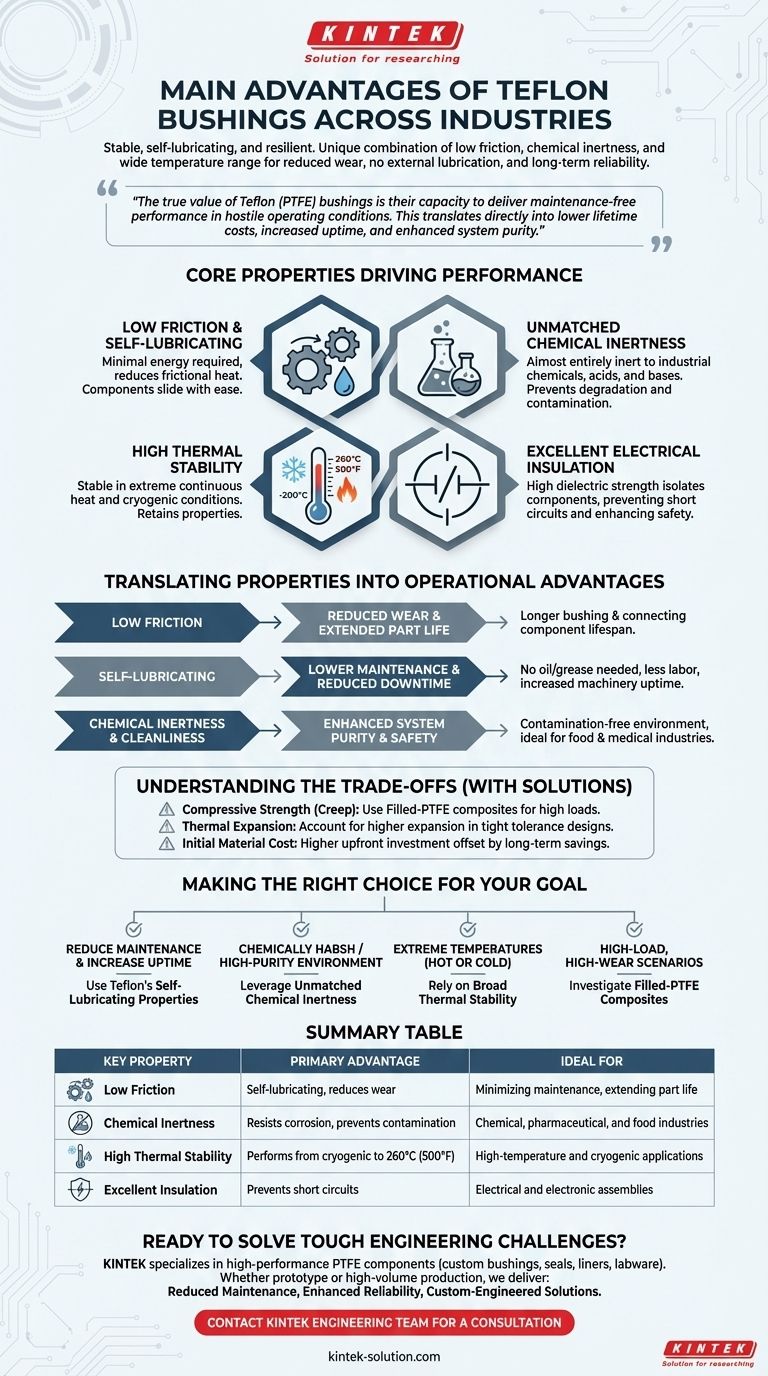At its core, the primary advantage of a Teflon bushing is its ability to create a stable, self-lubricating, and highly resilient interface between moving parts. Its value stems from a unique combination of an extremely low coefficient of friction, exceptional chemical inertness, and a wide operating temperature range. This allows Teflon to reduce wear, eliminate the need for external lubricants, and ensure long-term reliability in environments where other materials would quickly fail.
The true value of Teflon (PTFE) bushings is not just their "non-stick" quality, but their capacity to deliver maintenance-free performance in hostile operating conditions. This translates directly into lower lifetime costs, increased uptime, and enhanced system purity across a vast range of industries.

The Core Properties Driving Performance
The advantages of Teflon bushings are not isolated features; they are the direct result of the material's fundamental molecular structure. Understanding these properties is key to knowing why and where to apply them.
Exceptionally Low Coefficient of Friction
Teflon possesses one of the lowest coefficients of friction of any known solid material. This is its signature "non-stick" or self-lubricating characteristic.
This property means that components can slide against each other with minimal resistance, which dramatically reduces the energy required to operate the system and minimizes the generation of frictional heat.
Unmatched Chemical Inertness
Polytetrafluoroethylene (PTFE), the chemical name for Teflon, is almost entirely inert. It is unaffected by the vast majority of industrial chemicals, acids, and bases.
This makes Teflon bushings an ideal choice for equipment in chemical processing, pharmaceutical production, and food and beverage industries, where material degradation or product contamination is a critical concern.
High Thermal Stability
Teflon maintains its properties across a very wide temperature spectrum, remaining stable in continuous use at temperatures up to 260°C (500°F) and retaining its properties even at cryogenic levels.
This thermal resilience allows it to be used in high-temperature applications like automotive engines and industrial machinery, as well as in systems exposed to extreme cold.
Excellent Electrical Insulation
Teflon is an exceptional electrical insulator, a property known as high dielectric strength.
This quality makes Teflon components, including bushings and washers, valuable for isolating components in electrical and electronic assemblies, preventing short circuits and enhancing safety.
Translating Properties into Operational Advantages
These core properties deliver tangible benefits that solve common engineering and operational challenges, leading to more efficient, reliable, and cost-effective systems.
Reduced Wear and Extended Part Life
By minimizing friction between moving parts, Teflon bushings directly reduce mechanical wear and surface damage. This extends the operational lifespan of not just the bushing, but of all connecting components.
Lower Maintenance and Reduced Downtime
Because Teflon is self-lubricating, it eliminates the need for oil or grease. This removes a major maintenance task, saving labor costs and, more importantly, reducing machinery downtime. In continuous-use systems, this is a significant driver of profitability.
Enhanced System Purity and Safety
In industries like food processing or medical device manufacturing, traditional lubricants are a source of potential contamination. Teflon's inert, self-lubricating nature ensures a clean operating environment, safeguarding product purity.
Understanding the Trade-offs
No material is perfect for every situation. Being a trusted advisor means acknowledging the limitations to ensure proper application.
Compressive Strength and Load
Standard PTFE can be susceptible to "creep" or cold flow, meaning it can deform over time when placed under a high, constant load. This is a critical design consideration.
For high-load applications, filled-PTFE composites—which blend Teflon with materials like glass, carbon, or bronze—are used to enhance compressive strength and wear resistance while retaining Teflon's core benefits.
Thermal Expansion
Teflon has a higher coefficient of thermal expansion than metals. Engineers must account for this in designs that require tight tolerances across a wide range of operating temperatures, ensuring gaps are specified correctly to prevent binding.
Initial Material Cost
The upfront cost of a Teflon bushing can be higher than that of a simple bronze or nylon alternative. However, this initial expense is often quickly offset by the significant reduction in long-term maintenance, downtime, and associated component replacement costs.
Making the Right Choice for Your Goal
The decision to use Teflon bushings should be based on a clear understanding of your primary operational challenge.
- If your primary focus is reducing maintenance and increasing uptime: Teflon's self-lubricating properties are your greatest asset, eliminating the need for routine greasing and inspection.
- If you are operating in a chemically harsh or high-purity environment: Teflon's unmatched chemical inertness ensures material integrity and prevents system contamination where other materials would corrode.
- If your application involves extreme temperatures: Teflon's broad thermal stability makes it a reliable choice for both high-heat and cryogenic systems where other plastics or lubricants would fail.
- If you are designing for high-load, high-wear scenarios: Investigate filled-PTFE composites to gain the benefits of Teflon while mitigating its natural softness.
Ultimately, choosing Teflon bushings is a strategic investment in the long-term operational stability and reliability of your mechanical system.
Summary Table:
| Key Property | Primary Advantage | Ideal For |
|---|---|---|
| Low Friction | Self-lubricating, reduces wear | Minimizing maintenance, extending part life |
| Chemical Inertness | Resists corrosion, prevents contamination | Chemical, pharmaceutical, and food industries |
| High Thermal Stability | Performs from cryogenic to 260°C (500°F) | High-temperature and cryogenic applications |
| Excellent Insulation | Prevents short circuits | Electrical and electronic assemblies |
Ready to solve your toughest engineering challenges with precision Teflon components?
At KINTEK, we specialize in manufacturing high-performance PTFE components, including custom bushings, seals, liners, and labware. Whether you need a prototype for a new design or high-volume production for a critical application, our expertise ensures a solution that delivers:
- Reduced Maintenance & Downtime: Leverage the self-lubricating properties of PTFE to eliminate external lubricants and increase uptime.
- Enhanced Reliability in Harsh Conditions: Our components withstand extreme temperatures and aggressive chemicals, ensuring long-term performance.
- Custom-Engineered Solutions: We work with filled-PTFE composites and other formulations to meet specific load, wear, and environmental requirements.
We serve the semiconductor, medical, laboratory, and industrial sectors with a commitment to precision and quality. Let's discuss how our PTFE components can improve your system's efficiency and reliability. Contact our engineering team today for a consultation.
Visual Guide

Related Products
- Custom PTFE Parts Manufacturer for Teflon Containers and Components
- Custom PTFE Parts Manufacturer for Teflon Parts and PTFE Tweezers
- Customizable PTFE Rods for Advanced Industrial Applications
- Custom PTFE Sealing Tapes for Industrial and High Tech Applications
- Custom PTFE Teflon Balls for Advanced Industrial Applications
People Also Ask
- What post-machining treatments are applied to Teflon parts? Stabilize and Clean, Don't Modify.
- What applications are suitable for spring energized PTFE seals? Master Extreme Sealing Challenges
- What are the applications of PTFE chevron packing in the aerospace industry? Ensure Reliability in Extreme Conditions
- What role do PTFE gaskets play in the food and beverage industry? Ensuring Purity and Compliance
- What are the key properties of PTFE expansion bellows? Achieve Unmatched System Protection
- What is cryogenic deburring and how does it work for Teflon parts? Achieve a Flawless Finish Without Damage
- What are the key properties of PTFE industrial coating? Discover Unmatched Performance for Demanding Industries
- How do PTFE washers perform in extreme temperature conditions? Unmatched Stability from -200°C to 260°C



















